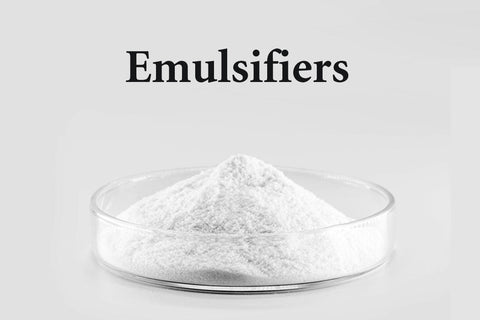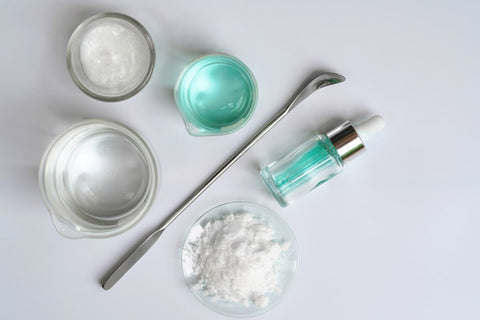In the world of cosmetic products, many raw materials are used to create various formulations. Emulsifiers, for example, serve an essential function in ensuring that diverse ingredients are blended harmoniously.

Emulsifier thickens, smoothes, and stabilizes your product. They are the unsung heroes responsible for many cosmetic products' consistency, stability, and effectiveness. So, let's see the roles of Emulsifiers in Cosmetics products.
What Are Emulsifiers?
Emulsifiers are a chemical that allows two or more immiscible substances, such as oil and water, to be blended. Because these compounds include both a hydrophilic (water-attracting) and a lipophilic (oil-attracting) component, they can stabilize mixes that might otherwise separate.
Need Of Emulsifiers In Cosmetic Products
Emulsifiers are essential in cosmetic formulations for a variety of reasons. It helps stabilize and improve the thickness and texture of the product. It also aids in enhancing skin penetration, etc. So, let’s see why we need emulsifiers in cosmetic products.
1. Stability:
Emulsifiers are essential for the stability of cosmetic products. Cosmetic formulations are frequently made up of oil and water-based components. These components would naturally separate over time if emulsifiers were absent, resulting in uneven textures and an unpleasant appearance.

Emulsifiers prevent phase separation by lowering the surface tension between oil and water. This guarantees that the product remains homogeneous and visually pleasing, which is important in goods such as creams, lotions etc.
2. Texture And Feel:
Emulsifiers help cosmetic products have a rich texture and feel. They help to achieve the desired consistency, making products smooth, creamy, and easy to apply.

This texture improves the product's sensory experience by making it feel nice on the skin. This factor is critical for customer satisfaction and a cosmetic product's success.
3. Absorption And Penetration:
Emulsifiers are necessary for enhancing active ingredient absorption and penetration into the skin. Emulsifiers aid in the breakdown of barriers between oil and water phases in the formulation of many cosmetic products, particularly those containing active chemicals such as moisturizers, anti-aging agents, or vitamins.

This allows the skin to absorb and utilize the beneficial nutrients more effectively, boosting the product's efficiency.
4. Longer Shelf Life:
Emulsifiers help extend cosmetic goods' shelf life. They prevent the growth of undesirable microorganisms, such as bacteria and mould, which can lead to spoilage and product degradation by stabilizing the formulation.

This preservation function is crucial for customer safety and product efficacy because it ensures the product is safe and operates as intended for its shelf life.
5. Ease Of Formulation:
Emulsifiers help cosmetic makers make the formulation process easier. They aid in the blending and stabilizing the many materials used in cosmetics, which can be a diverse and complicated blend of oils, water, active compounds, scents, and other chemicals.
Emulsifiers aid emulsification, allowing manufacturers to produce consistent, high-quality products.
Types Of Emulsifiers In Cosmetics
We hope you understand why we need emulsifiers in cosmetic products. Now, let’s see the several types of emulsifiers in cosmetics, each with its features and advantages.

1. Anionic Emulsifiers:
An anionic emulsifier has a negatively charged hydrophilic (water-attracting) group. They are often used in shampoos and body cleansers to help stabilize oil-water mixes. These emulsifiers perform well in cleansing solutions, ensuring that oils and water-based substances interact correctly, resulting in efficient cleansing.
2. Cationic Emulsifiers:
Cationic emulsifiers have a positively charged hydrophilic group. They are frequently found in hair conditioners and skin softeners, where they increase the texture and conditioning capabilities of the products. Cationic emulsifiers are particularly useful in products that give hair and skin a smooth, soft feel.
3. Non-Ionic Emulsifiers:
Non-ionic emulsifiers are adaptable and compatible with various chemicals. Because of their capacity to form stable emulsions, they are commonly utilized in cosmetic products such as creams and lotions. Non-ionic emulsifiers are popular because they interact less with other components in the formulation and are generally well-tolerated by different skin types.
4. Amphiphilic Emulsifiers:
Amphiphilic emulsifiers have hydrophilic and lipophilic properties, making them ideal for stabilizing complex compositions comprising oil and water components. They can bridge the gap between these two phases, creating a stable and homogenous combination. These emulsifiers are found in various goods containing numerous active ingredients.
5. Natural Emulsifiers:
Natural emulsifiers come from natural sources such as beeswax and lecithin. They are popular among customers looking for eco-friendly and skin-friendly products. Natural emulsifiers are preferred since they are derived from renewable resources and are gentle on the skin. They are frequently found in organic and natural cosmetics.
6. Silicone Emulsifiers:
Silicone emulsifiers are widely used in cosmetics and skin care products to improve spreadability and produce a smooth, velvety texture. These emulsifiers are well-known for imparting a soft and lightweight sensation to the skin, making them ideal for high-end cosmetic products.
7. Polymeric Emulsifiers:
Polymeric emulsifiers are incredibly stable and are employed in goods requiring long-term effects. They are especially suited to cosmetics intended to stay on the skin for extended periods, such as long-wear foundations and sunscreens. Polymeric emulsifiers contribute to the product's long-term integrity and performance.
8. Protein-Derived Emulsifiers:
These emulsifiers are made from proteins, mostly soy and wheat. They are frequently included in skincare treatments intended to nourish and renew the skin. Protein-derived emulsifiers can provide skin conditioning, healing, and nourishment in addition to their emulsifying effects. They are instrumental in products aimed at improving skin health.
How Do You Select The Right Emulsifier For Cosmetic Products?
The formulation needs and desired product qualities determine the proper emulsifier. Consider the product type, the skin type it is intended for, and compatibility with other substances. Stability and compatibility testing are required to identify the emulsifier that will deliver the desired texture, appearance, and performance.

Manufacturers should also examine whether consumers prefer natural or synthetic emulsifiers, which can affect the product's marketability.
Conclusion
Emulsifiers are unsung heroes in the cosmetics industry, ensuring that products remain stable, feel lovely on the skin, and effectively transport active ingredients. Understanding the many types of emulsifiers and how to choose the best one is critical for producing high-quality cosmetic formulations that fulfil the needs of both producers and consumers.













 Sign in
Sign in Register now
Register now My Reward Points
My Reward Points









